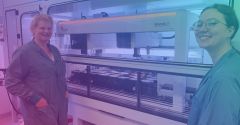G2Solutions: Funding for Innovation in Single-Cell Genomics
Thursday 19 September 2024
- Life Cooperative
The G2Solutions project, led by Prof. Dr. Ir. Floris Foijer from the UMCG – ERIBA Research Institute, has received funding from PharmaNL under the PharmaNL Shared Development Infrastructure program for their five-year project. G2Solutions focuses on developing infrastructure for new drug development. “This project demonstrates that we can make unique technologies, such as single-cell sequencing and stem cell and organoid production, available to the world, creating new opportunities for drug development,” says Peter Ketelaar, director of LIFE Cooperative. The project involves close collaboration between UMCG/ERIBA, UMCG/Genetics, LIFE Cooperative, GenomeScan, and Pivot Park Screening Centre.
G2Solutions utilizes groundbreaking technologies, including single-cell genomics. This technology, in which UMCG is a global leader, allows for the analysis of the genome of individual cells. This is crucial for chronic and complex diseases such as cancer, where the genome of cancer cells often shows significant variations. Instead of obtaining an average picture from millions of cells in a tissue, single-cell sequencing provides insights into the genetic abnormalities of individual cells. “The unique aspect of our approach is that we can read the DNA of individual cells, allowing us to examine much more closely what is happening within a tumor,” explains Foijer.
From Lab to Market
The techniques being developed in the project not only have scientific value but also significant commercial applications. Floris Foijer emphasizes that one of the main goals is to explore whether these technologies can be made widely accessible and affordable for diagnostics and therapies. Peter Ketelaar adds: “The biggest challenge for the business side is to find the right product-market combinations that can lead to sustainable success. We need to make technologies that are currently working in the lab affordable and applicable for a broader and international market.”
Expertise
The project aims to make this infrastructure available to other pharmaceutical and academic partners, both nationally and internationally. Pivot Park Screening Centre, GenomeScan, and LIFE Cooperative are involved in further developing and marketing these technologies. Brigitte Drees from Pivot Park Screening Centre: “In this project, we are using our expertise to accelerate and optimize the development of new technologies. With our extensive experience in high-content screening and bioprofiling services, we contribute to identifying promising leads for drug development, which is crucial for the success of this innovative project.”
Kees van den Berg, CEO of GenomeScan explains: “At GenomeScan, we have extensive knowledge and experience in developing existing sequencing technologies from academia into a commercial facility for pharmaceutical and biotech companies. We will also apply this expertise to this innovative project.”
Ultimately, the goal is to establish a commercial company that will continuously offer the acquired knowledge and improved techniques. Foijer: “It’s an exciting journey to see whether we can bring academic technology to the market within five years. This project brings together science, technology, and entrepreneurship – a unique opportunity to achieve groundbreaking innovations.”

The Art of Sharing
Floris Foijer and Peter Ketelaar also share some tips for future grant applicants at PharmaNL. Peter emphasizes that a successful grant application requires both strong technology and experienced entrepreneurs with market knowledge. “The core technology must be solid and fairly unique,” he says. “Additionally, you need to involve people who know how to bring new products and technologies to market. Understand the landscape of the subsidy world and the requirements, such as those of the funding provider.”
Floris adds that intrinsic motivation for collaboration and openness is crucial. “You need to have the desire to make your resources available, not just to secure funding for your own organization,” he explains. “Creating truly open infrastructure requires a willingness to share and collaborate.”
Source text: PharmaNL
Photo: Mathilde Broekhuis and Laura Kempe (two professionals at ERIBA) at the robot, photographer Floris Foijer.
Focus areas
Life CooperativeLatest news
-
Monday 7 October 2024
NoordZ: ‘Collaboration as the Key to Success’
-
Wednesday 25 September 2024
LIFE Cooperative celebrates 10th anniversary during sold-o..
-
Tuesday 27 August 2024
Three finalists in the running for the LIFE Science Innova..
-
Monday 19 August 2024
LIFE Cooperative Expands Impact with PharmaNL Grant for &#..
-
Monday 15 July 2024
Register now for the Compact MBA Fall 2024!
-
Wednesday 19 June 2024
Marcel Levi Keynote Speaker at LIFE Science Conference on ..
-
Wednesday 22 May 2024
Anniversary in BiotechNEWS & Life Sciences: 10 Years ..
-
Wednesday 3 April 2024
Founder Talks Life Sciences looks back on a successful eve..
-
Tuesday 20 February 2024
700,000 euros subsidy from PharmaNL for the development of..
-
Thursday 8 February 2024
Succesful matchmaking during Meet & Greet Life Science..

 English
English
 Nederlands
Nederlands